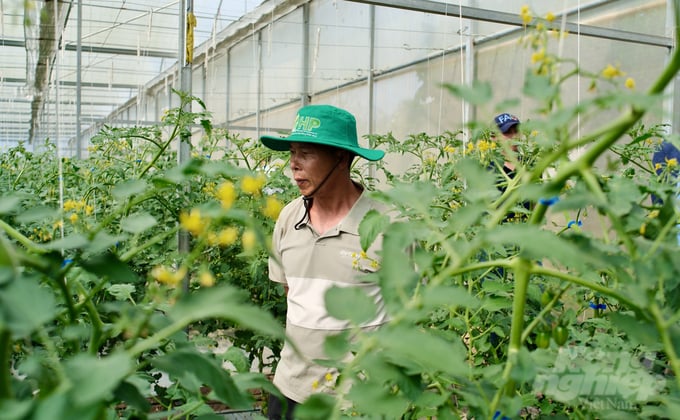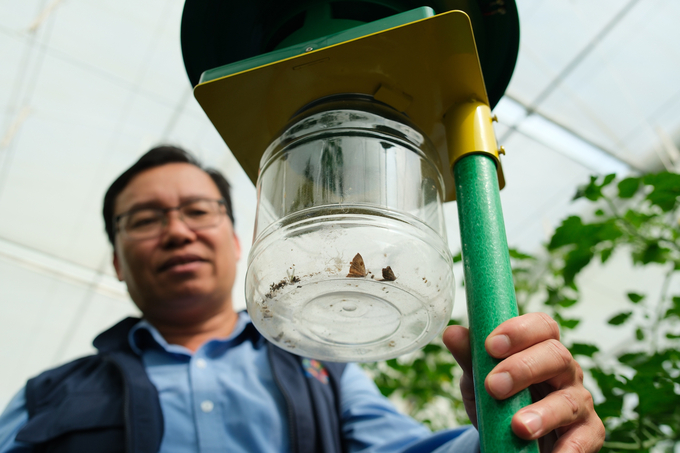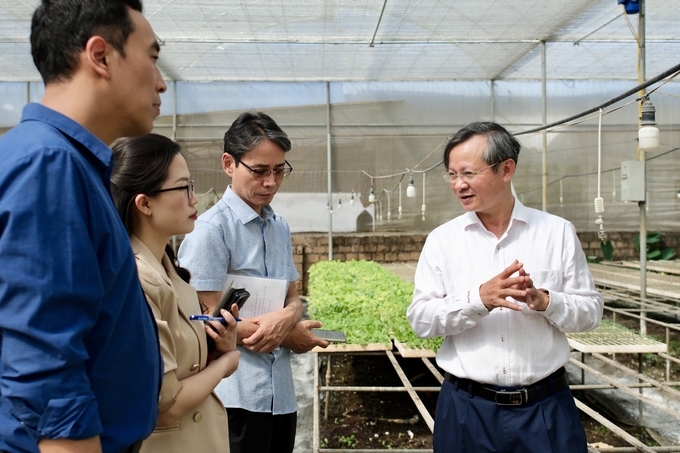May 30, 2025 | 07:43 GMT +7
May 30, 2025 | 07:43 GMT +7
Hotline: 0913.378.918
May 30, 2025 | 07:43 GMT +7
Hotline: 0913.378.918
The project “Smart Agriculture for Future Generations” is funded by the Korean Government through the Food and Agriculture Organization of the United Nations (FAO) and approved by the Son La Provincial People's Committee. It is implemented by the Fruit and Vegetable Research Institute (FAVRI) under the Vietnam Academy of Agricultural Sciences, an agency of the Ministry of Agriculture and Rural Development.
Over three years of implementation, the project has established a smart agricultural ecosystem, benefiting 34 local households. Moc Chau farmers are becoming increasingly confident in using technologies and techniques for organic fruit and vegetable production.

Mr. Ha Van Tien in his 1,700m2 greenhouse sponsored by the Korean Government. Photo: Quynh Chi.
Mr. Ha Van Tien, a resident of Sub-zone 14 in Moc Chau Town, Moc Chau District, is a pioneer in the local sustainable farming movement. Among the greenhouses supported by the project, his is a standout model, frequently visited by others seeking to learn and adopt modern techniques.
Upon entering Mr. Tien’s 1,700m2 greenhouse, visitors are greeted by vibrant greenery, with healthy plants and lush foliage. A longtime advocate of organic and safe agricultural production, Mr. Tien has been refining his approach for years.
Three years ago, he learned greenhouse bell pepper cultivation techniques from a colleague in southern Vietnam. He applied composted cow manure as organic fertilizer, but the lack of specialized knowledge and suitable technology posed significant challenges. That bell pepper crop was plagued by diseases, yielded poorly, and produced low-quality fruits.
Everything changed when Mr. Tien joined the smart agriculture project. For the 2024 bell pepper crop, he received seedlings and all necessary materials from the project. High-tech equipment was also installed to monitor critical factors like humidity, temperature, and wind speed, with updates provided hourly.
“Since FAO came to our community, we’ve gained access to the latest techniques, and the quality of our products has improved significantly. Previously, our crops were often diseased, and the fruit wasn’t visually appealing. Now, from the early stages of growth to harvest, the plants and fruit are consistently healthy. Market access has also become much easier,” Mr. Tien shared enthusiastically.

A solar-powered insect trap installed by FAO staff in Mr. Ha Van Tien's greenhouse. Photo: Quynh Chi.
The first bell pepper crop grown in the high-tech greenhouse yielded 25 tons. The average price ranged from 25,000 to 27,000 VND per kilogram, which is about 5,000 VND higher than before the adoption of the project’s techniques. At peak times, the price even reached 40,000 VND per kilogram.
Earning 700 million VND from the first crop, Mr. Tien boldly invested in an additional 3,000m2 greenhouse on a nearby hill to grow tomatoes using the advanced FAO-transferred techniques. Although he installed a complete insect-proof net and drip irrigation system, the new greenhouse still lacked a shade net.
“My dream is to upgrade all my greenhouses to meet the same standards as the project’s greenhouses. I’m committed to making it happen,” Mr. Tien said with determination, proving that age is no barrier to ambition.
At the Tu Nhien Vegetable Cooperative in Dong Sang Commune, Moc Chau District, farmer Thai Thi Van has entered her fifth year of providing seedling services.
Before joining the smart agriculture project, the quality of her seedlings was often poor. One key issue was her reliance on garden soil as the growing medium, which made the plants prone to disease and negatively impacted productivity and output.
Farmers in the region previously grow tomatoes and peppers directly from seed. However, this method has drawbacks: high-yielding, high-quality varieties often lack resistance to soil-borne diseases, while disease-resistant varieties typically have lower yields.
To address this limitation, the FAVRI organized training sessions for Ms. Van and two other local nursery owners on grafting techniques. These techniques combine high-yielding scions with disease-resistant rootstocks, significantly improving the quality of seedlings. As a result, the success rate of grafted seedlings increased from 70% to 90%.

Dr. Nguyen Quoc Hung - Director of the FAVRI (right) discussed with representatives from the Ministry of Agriculture, Food and Rural Affairs of Korea about the technical solutions that the Institute provides to farmers for seedling cultivation. Photo: Quynh Chi.
With the growing demand for high-quality seedlings for organic production in Son La, Ms. Van has also worked to enhance her products. Previously, she mixed her own growing medium using cow manure, rice husks, and coconut fiber. Now, she has transitioned to using premium substrate imported from Europe, ensuring better seedling quality.
Additionally, Ms. Van received an automatic seeding machine, which has optimized her entire production process. Tasks such as packing soil into trays, sifting soil, removing debris, making holes, sowing seeds, covering seeds, and stacking trays are now performed with precision and efficiency.
The automatic seeding machine allows Ms. Van to produce up to 1,000 seed trays per day, more than double her previous productivity of 300 to 400 trays per day. With less physical effort required and higher efficiency, Ms. Van is thrilled with the positive impact on her family’s income and overall economic stability.
Translated by Quynh Chi
/2025/05/25/4127-3-073637_820.jpg)
(VAN) Thanks to the promotion from an FAO-implemented project, vegetable production in greenhouses in Moc Chau has seen strong development, from 1.5 hectares in 2021 to nearly 50 hectares in 2024.

(VAN) FAO has recently supported USD 140,000 to implement the project 'Risk mitigation human-animal interface risks through disease control initiatives in pig farming.'

(VAN) The People's Committee of Tra Vinh province has approved an adjustment to the investment policy for the Green Hydrogen Plant project, increasing its area to approximately 52.76 hectares.
![Reducing emissions from rice fields: [2] Farmers’ commitment to the soil](https://t.ex-cdn.com/nongnghiepmoitruong.vn/608w/files/news/2025/05/05/dsc08881jpg-nongnghiep-140632.jpg)
(VAN) Clean rice cultivation model in Thuong Tan commune, Bac Tan Uyen district, is assisting local residents in achieving sustainable agriculture by substantially reducing costs, increasing productivity, and protecting the environment.

(VAN) At the conference to disseminate Resolution No. 68, AgriS introduced its digital agricultural ecosystem and reaffirmed its commitment to accompanying the Government in promoting private sector development and sustainable agriculture.

(VAN) 'Blue Ocean - Blue Foods' initiative is designed to restore marine ecosystems and establish sustainable livelihoods for local communities by cultivating a minimum of 1,000 hectares of cottonii seaweed in the first three years.
/2025/05/21/4642-3-112707_603.jpg)
(VAN) The V-SCOPE project has made direct contributions to three out of six pillars of the Comprehensive Strategic Partnership between Vietnam and Australia.